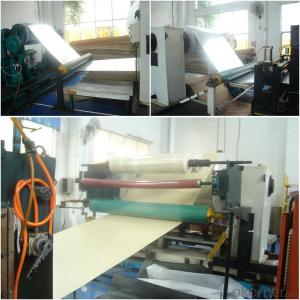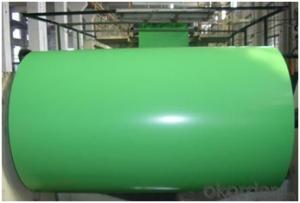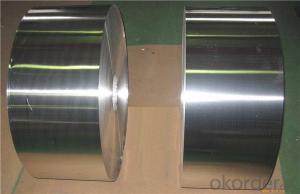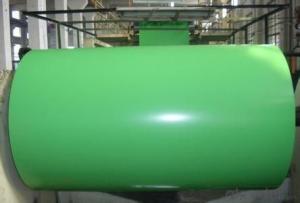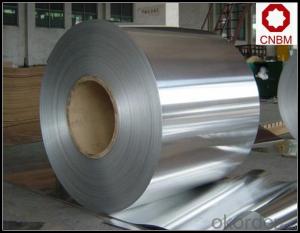solid color PE prepainted aluminium metal materials
- Loading Port:
- China Main Port
- Payment Terms:
- TT OR LC
- Min Order Qty:
- -
- Supply Capability:
- -
OKorder Service Pledge
OKorder Financial Service
You Might Also Like
Featuresof PVDF Aluminum Coil:
1. Adoptingprecision rolling coating technology, our PE coated coil can ensure excellentadhesive without coating omission.
2. For the PVDFcoated aluminum sheet we produced, there are various colors for your choice.
3. Usinginfrared heating technology to protect environment from pollution.
4. Ourcoated aluminum coil has four-roller coating line, uniform coating thicknessand good features.
Raw Materialof the PVDF Coated Aluminum Coil:
1. AluminumCoil: high strength aluminum with alloy of AA1100 (aluminum alloy is availablewith AA3003, AA3005, AA5005 according to customer)
2. SurfacePaint: PE, PVDF and special paints.
Specificationof the PVDF Coated Aluminum Coil:
Width: 20mm~1590mm
Thickness: 0.06mm~1.0mm
ExternalDiameter: ≤ 1500mm
InternalDiameter: 405mm, 505mm, 150mm, 75mm
Coil weight: ≤ 4000kg
Performance and usage
PVDF coated aluminumcoils are specially processed through the technics of roller coating and bakingwith precise paints from BECKER INDUSTRIAL COATINGS in
Performance of the coating
Aluminum Thickness | Coating Thickness | MEK | T Bend | Impact | Adhesion | Pencil Hardness | Boiling Water Proof |
0.3-1.5mm | ≥25μm | ≥100 Times | ≤2T | 50kg•cm | 0 Grade | ≥HB | no change within 2 hours |
0.15-0.28mm | ≥25μm | ≥100 Times | ≤2T | 20kg•cm | 0 Grade | ≥HB | no change within 2 hours |
Color ofCard
Our PVDF coated aluminum coil is made offluorine carbon resin, pigment, ester solvent after high temperature roastingand baking. The paint of this PVDF coated aluminum coils are solidified to dryfilm with super weather resistance. PVDF coating also can be classified astraditional PVDF and nanometer PVDF coating.
A. Traditional PVDF Coating, with KYNAR500 PVDF and two or three times forcoating and baking, has good properties of anti-acid, anti-alkali and isdurable in atrocious weather and environment, keeping 15 years no unwontedfading. In view of these facts, we recommend this PVDF coated aluminum coilsare applied for external wall cladding.
B. Nanometer PVDF Coating, which different with traditional PVDF, is the clearcoating. It contains nanometer element, which can protect panel from pollution,because nanometer has self-cleaning effect, it is easy to get rid of dust andpollution by raining or water.
Color Match
For custom' color requests, we can deal as following:
1. Supply a physical sample of custom color. A color sample on metal ispreferred. If other, it is also acceptable. But the color matching rate may benot good as color on metal.
2. New color sample is usually offered by our paint supplier in 5-7 days,special color should be in 7-10 days.
3. Upon receipt of color sample, please approve in writing as soon as possible.Once you approved, we will arrange purchasing and production.
Note: Color difference maybe occurred in different production batch, soit is suggested all panels are placed in one order for same project. And keepsame direction as arrow on protective film when installing to avoid any colordifference by vision.
- Q:How are aluminum coils used in the production of battery enclosures?
- Due to their exceptional properties, aluminum coils find wide application in the manufacturing of battery enclosures. Firstly, aluminum, being a lightweight material, is perfect for creating battery enclosures that are lightweight themselves, a crucial feature for portable devices and electric vehicles where weight reduction is of utmost importance. Moreover, aluminum coils can be easily shaped and sized to accommodate specific battery designs, giving manufacturers the ability to customize the enclosures. This flexibility in shaping also aids in optimizing space utilization and enhancing the overall efficiency of the battery system. Furthermore, aluminum exhibits high resistance to corrosion, a vital characteristic for battery enclosures that are frequently exposed to harsh chemicals and environments. This corrosion resistance ensures the longevity and dependability of the enclosure, safeguarding the battery cells from harm and guaranteeing safe operation. Additionally, aluminum possesses excellent thermal conductivity, enabling efficient dissipation of heat generated during battery charging and discharging. This is crucial in preventing overheating and maintaining the optimal temperature range for optimal battery performance. In conclusion, aluminum coils play a pivotal role in the production of battery enclosures by providing lightweight, customizable, corrosion-resistant, and thermally conductive properties. These properties contribute to the overall efficiency, safety, and durability of battery systems employed in a wide range of applications, including consumer electronics, electric vehicles, and renewable energy storage.
- Q:Are aluminum coils suitable for high-gloss applications?
- High-gloss applications can benefit greatly from the use of aluminum coils. This metal possesses outstanding reflective qualities and, when treated and finished correctly, can achieve a remarkable level of shine and gloss. Its smooth surface and reflective nature work together to enhance the appearance of high-gloss finishes, making it an excellent choice for those seeking a polished and shiny look. Aside from its aesthetic advantages, aluminum also offers several practical benefits for high-gloss applications. It is lightweight, durable, and resistant to corrosion, making it a reliable and low-maintenance option. Moreover, aluminum coils are highly malleable, allowing them to be easily molded into different shapes and sizes, a crucial aspect when aiming for the desired high-gloss design. Moreover, aluminum coils can be coated with various finishes, such as anodized coatings or high-quality paint systems, to further enhance their durability and glossiness. These coatings provide an extra layer of protection against scratches, fading, and other forms of wear and tear, ensuring the long-lasting maintenance of the high-gloss appearance. To summarize, aluminum coils are a perfect choice for high-gloss applications due to their reflective properties, versatility, and durability. With the right treatment and finishing, aluminum can provide a stunning and enduring glossy finish, making it highly sought after in diverse industries, including automotive, architecture, and interior design.
- Q:What are aluminum coils?
- Aluminum coils are thin, flat pieces of aluminum that are wound in a spiral shape. They are commonly used in various industries for their versatility and durability. These coils are typically made from high-quality aluminum alloy, which makes them lightweight, corrosion-resistant, and easy to work with. Aluminum coils are used in a wide range of applications, including building and construction, automotive manufacturing, electrical appliances, and packaging. They can be further processed into different forms, such as sheets, foils, or strips, depending on the specific requirements of the industry or product. Overall, aluminum coils are an essential component in many manufacturing processes and play a crucial role in various industries.
- Q:Can aluminum coils be used in the production of beverage cans?
- Yes, aluminum coils can be used in the production of beverage cans. Aluminum coils are commonly used because aluminum is lightweight, corrosion-resistant, and recyclable, making it an ideal material for beverage cans. The coils are typically formed into can bodies and lids, which are then further processed to create the final beverage cans.
- Q:Are there any health concerns associated with aluminum coils?
- Aluminum coils, commonly used in HVAC systems and refrigerators, have been a subject of health concerns due to the possible release of aluminum particles into the air or food. However, studies have consistently shown that the amount of aluminum released from these coils is typically very low, posing no significant health risks. Although aluminum is known to be a neurotoxin, exposure to aluminum coils generally remains well below the harmful threshold. The World Health Organization (WHO) has established a provisional tolerable weekly intake for aluminum, and the amount released from aluminum coils is significantly below this level. It is important to acknowledge that individuals with certain health conditions, such as kidney disease or aluminum sensitivity, may be more vulnerable to the potential health effects of aluminum exposure. In such cases, seeking advice from a healthcare professional or an HVAC specialist is advisable to determine the most appropriate course of action. In summary, while there are some health concerns associated with aluminum coils, they are generally considered minimal and unlikely to pose significant risks to the general population. Proper maintenance and installation of HVAC systems can effectively minimize any potential risks and ensure the safe and efficient operation of aluminum coils.
- Q:Are aluminum coils suitable for marine environments?
- Due to their excellent corrosion resistance properties, aluminum coils are well-suited for use in marine environments. One of the reasons for this is that aluminum naturally develops an oxide layer on its surface, which acts as a protective barrier against saltwater corrosion. Consequently, aluminum coils demonstrate a high level of resistance to rust and deterioration caused by exposure to marine conditions. Furthermore, the lightweight nature of aluminum makes it an ideal choice for marine applications where reducing weight is crucial. Moreover, aluminum coils possess good thermal conductivity, which is advantageous for dissipating heat in marine cooling systems. All in all, aluminum coils are a dependable and durable option for marine environments, guaranteeing long-lasting performance and minimal maintenance needs.
- Q:Can aluminum coils be used in electrical cables?
- Yes, aluminum coils can be used in electrical cables. Aluminum is a commonly used material for electrical conductors due to its excellent electrical conductivity and relatively low cost compared to copper. It is especially used in power transmission and distribution cables where long-distance transmission is required. Aluminum coils are often used in overhead power lines and underground cables. However, it is important to note that aluminum has a lower tensile strength than copper, so the cables need to be properly designed and manufactured to ensure adequate mechanical strength. Additionally, aluminum conductors require larger cross-sectional areas compared to copper to achieve the same electrical performance, which can result in slightly larger cable sizes.
- Q:How do aluminum coils contribute to energy-efficient lighting systems?
- Aluminum coils contribute to energy-efficient lighting systems by improving the heat dissipation process. When used in the construction of LED lighting fixtures, aluminum coils help in efficiently transferring heat away from the LED chips, preventing overheating and reducing energy consumption. This improved heat management ensures that the lighting system operates at optimal temperature, thereby extending the lifespan of the LEDs and enhancing overall energy efficiency.
- Q:Are there any limitations on the anodizing of aluminum coils?
- Yes, there are certain limitations on the anodizing of aluminum coils. Firstly, the size and weight of the aluminum coils can impose limitations. Anodizing is typically done in tanks or baths, so the size of the coil must fit within the capacity of the tank. Additionally, larger and heavier coils may require specialized equipment or processes to ensure proper anodizing. Secondly, the alloy composition of the aluminum coils can affect the anodizing process. Different aluminum alloys have varying levels of response to anodizing, and some alloys may not anodize as well as others. It is important to consider the alloy composition and consult with experts to determine the suitability and potential limitations of anodizing specific aluminum coils. Thirdly, the surface condition of the coils can impact the quality of anodizing. Any imperfections such as scratches, dents, or surface contaminants can affect the evenness and consistency of the anodized layer. It is essential to ensure that the coils are properly cleaned and prepared before anodizing to achieve desired results. Lastly, certain design features or complex shapes of the aluminum coils can pose limitations on anodizing. Anodizing involves the immersion of the coil in an electrolyte solution, and intricate designs or complex shapes may make it challenging to achieve uniform coating thickness. Specialized masking or racking techniques may be required to overcome these limitations. It is important to work closely with anodizing experts or service providers to understand and address any limitations specific to the aluminum coils and achieve the desired anodizing results.
- Q:Aluminum is directly below Mg. If aluminum is oxidized so readily, then how can we make planes or ships out of it and they don't fall apart after a few months or years?
- Yes aluminum does oxidize just like any other metal. The difference is that aluminum oxidizes the same color as the metal therefore you cannot tell that is oxidizing. Once is oxidizes a little bit, the oxidize protects the metal and it does not oxidize any more.
1. Manufacturer Overview |
|
|---|---|
| Location | |
| Year Established | |
| Annual Output Value | |
| Main Markets | |
| Company Certifications | |
2. Manufacturer Certificates |
|
|---|---|
| a) Certification Name | |
| Range | |
| Reference | |
| Validity Period | |
3. Manufacturer Capability |
|
|---|---|
| a)Trade Capacity | |
| Nearest Port | |
| Export Percentage | |
| No.of Employees in Trade Department | |
| Language Spoken: | |
| b)Factory Information | |
| Factory Size: | |
| No. of Production Lines | |
| Contract Manufacturing | |
| Product Price Range | |
Send your message to us
solid color PE prepainted aluminium metal materials
- Loading Port:
- China Main Port
- Payment Terms:
- TT OR LC
- Min Order Qty:
- -
- Supply Capability:
- -
OKorder Service Pledge
OKorder Financial Service
Similar products
New products
Hot products
Hot Searches
Related keywords
